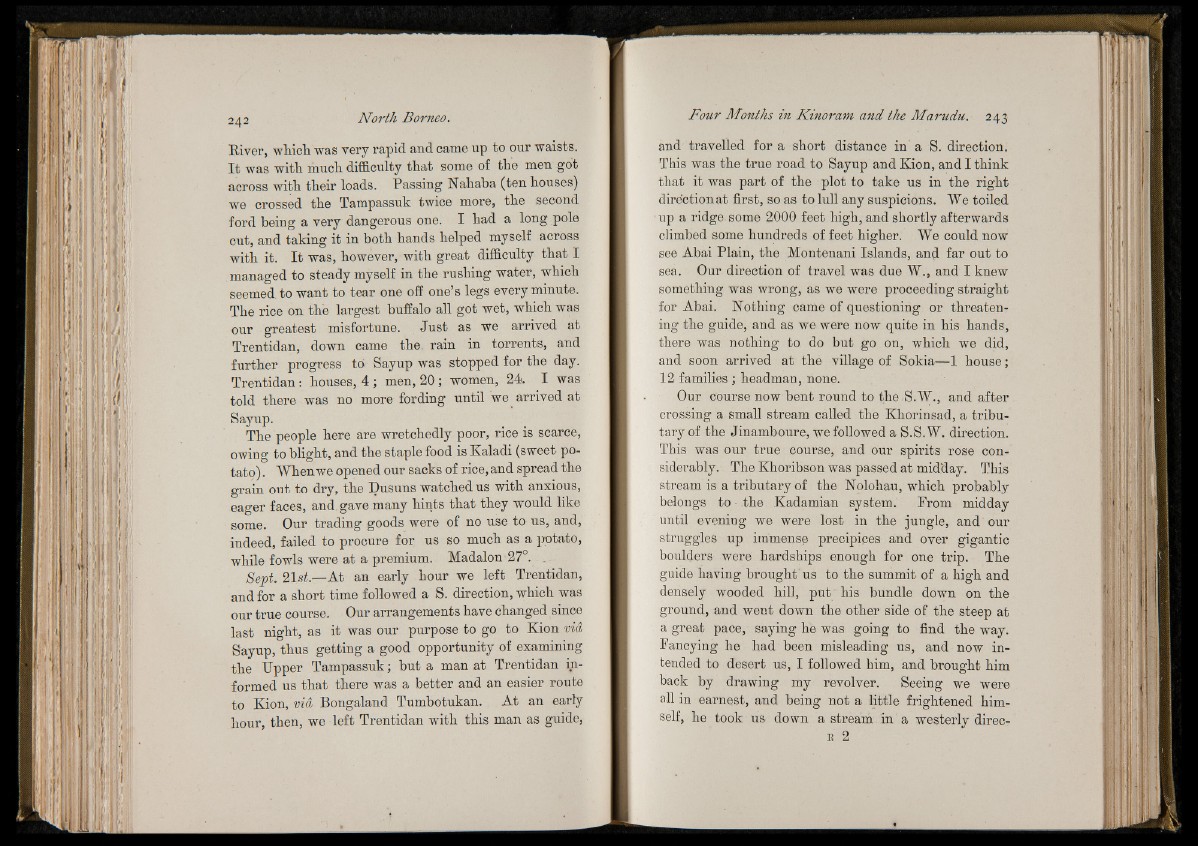
River, which was very rapid and came up to our waists.
I t was with much difficulty that some of the men got
across with their loads. Passing Nahaba (ten houses)
we crossed the Tampassuk twice more, the second
ford being a very dangerous one. I had a long pole
cut, and taking it in both hands helped myself across
with it. I t was, however, with great difficulty that I
managed to steady myself in the rushing water, which
seemed, to want to tear one off one’s legs every minute.
The rice on the largest buffalo all got wet, which was
our greatest misfortune. Just as we arrived at
Trentidan, down came the. rain in torrents, and
further progress to Sayup was stopped for the day.
Trentidan: houses, 4 ; men, 20; women, 24. I was
told there was no more fording until we arrived at
Sayup.
The people here are wretchedly poor, rice is scarce,
owing to blight, and the staple food is Kaladi (sweet potato)
. When we opened our sacks of rice, and spread the
grain out to dry, the Dusuns watched us with anxious,
eager faces, and. gave many hints that they would like
some. Our trading goods were of no use to us, and,
indeed, failed to procure for us so much as a potato,
while fowls were at a premium. Madalon 27°. .
Sept. 21 st.—At an early hour we left Trentidan,
and for a short time followed a S. direction, which was
our true course. Our arrangements have changed since
last night, as it was our purpose to go to Kion via
Sayup, thus getting a good opportunity of examining
the IJpper Tampassuk; but a man a t Trentidan informed
us that there was a better and an easier route
to Kion, via Bongaland Tumbotukan. At an early
hour, then, we left Trentidan with this man as guide,
and travelled for a short distance in a S. direction.
This was the true road to Sayup and Kion, and I think
that it was part of the plot to take us in the right
direction at first, so as to lull any suspicions. We toiled
up a ridge some 2000 feet high, and shortly afterwards
climbed some hundreds of feet higher. We could now
see Abai Plain, the Montenani Islands, and far out to
sea. Our direction of travel was due W., and I knew
something was wrong, as we were proceeding straight
for Abai. Nothing came of questioning or threatening
the guide, and as we were now quite in his hands,
there was nothing to do but go on, which we did,
and soon arrived at the village of Sokia—1 house;
12 families ; headman, none.
Our course now bent round to the S.W., and after
crossing a small stream called the Khorinsad, a tributary
of the Jinamboure, we followed a S.S. W. direction.
This was our true course, and our spirits rose considerably.
The Khoribson was passed at midday. This
stream is a tributary of the Nolohau, which probably
belongs to the Kadamian system. Prom midday
until evening we were lost in the jungle, and our
struggles up immense precipices and over gigantic
boulders were hardships enough for one trip. The
guide having brought'us to the summit of a high and
densely wooded hill, put "his bundle down on the
ground, and went down the other side of the steep at
a great pace, saying he was going to find the way.
Fancying he had been misleading us, and now intended
to desert us, I followed him, and brought him
back by drawing my revolver. Seeing we were
all in earnest, and being not a little frightened himself,
he took us down a stream in a westerly direcr
2